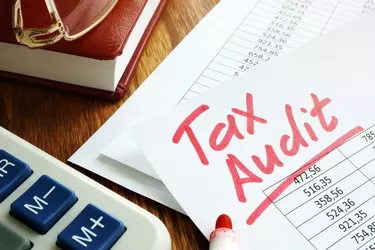
If you file taxes, then there is a good chance that your return will be pulled for an audit during your lifetime. This is not nearly as scary as it sounds and really, it's only a tiny fraction of returns that get audited with any depth or that require a visit to your office. Knowing what to expect during an IRS audit can be the difference between being paralyzed by fear or guided by knowledge. It is best that you know what to expect so that you can take steps to adequately present your case to the IRS.
Who Gets Audited?
Video of the Day
First of all, it is important to understand that the IRS selects returns for audits in order to verify the accuracy of items listed on a taxpayer's income tax return. According to the IRS, an audit is not an indication of wrongdoing. Sometimes, there may just be an innocent mistake on your tax return, or you may have crossed paths with someone who is on the tax authority's radar for an unrelated reason.
Video of the Day
By some estimates, only one out of every 160 returns gets audited by the IRS, and most of those are handled by correspondence. Overall, the odds of being audited are low.
Consider also: Tax Audits: What Are They, Why Are You Audited & IRS Audit Outcomes
How an Audit Works
The IRS uses a computer scoring system called Discriminant Function System (DIF) to score your return against those of similarly situated filers. Other taxpayers are chosen because the income listed on their returns doesn't match the income information listed on other 1099s or W-2s sent to the IRS by an employer or payee. Generally, you will receive a notice in the mail asking you to submit additional information to support the deductions, exemption, credits or income listed on your income tax return.
If the audit is conducted by mail, you can mail your supported documentation to the address listed on the notice. If the audit is conducted in person, then you can choose whether the audit will be conducted at an IRS office, your home or your place of business.
Consider also: What if I Made a Mistake on my Taxes?
Typical Audit Time Frame
There is no specific time frame that dictates when you will receive your refund except that whatever refund you are owed will be sent to you after the IRS has had time to thoroughly review your documentation. Once a determination is made, you will receive a determination letter in the mail and you can choose to agree or disagree with the results.
If you agree, then you are responsible for paying any tax owed as a result of the audit. If you do not agree, then you can request Fast Track Mediation to resolve the issue or appeal the decision. Your instructions for appeal are included in the last paragraph of your determination notice. You generally have 30 days to appeal the decision.
How to Pay Your Tax Bill
If the audit leaves you owing tax and you cannot pay the amount in full, you can agree to pay a monthly amount. Complete IRS Form 9465 and mail it to the IRS to set up an installment agreement. You can also log on the IRS website to use its Online Payment Agreement application. The cost to set up a payment plan ranges from $130 to $225, but it is reduced for those who agree to have the funds direct-debited from their accounts.